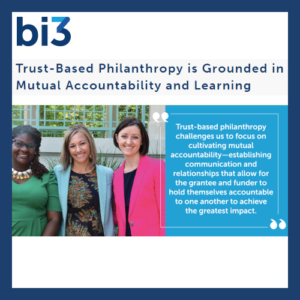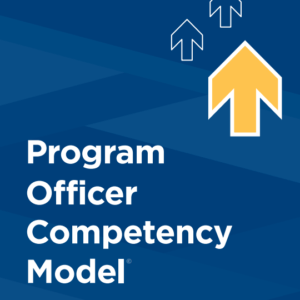Past Events
Featured Resources
bi3 Article: Trust-Based Philanthropy is Grounded in Mutual Accountability and Learning
A new article shows how applying a trust-based philanthropy lens helps funders capture the full impact of grants, describes how bi3 evaluates initiatives, and how building funder-grantee relationships grounded in power-sharing, transparency, and mutual accountability helps achieve greater impact.
New Competency Model for Foundation Program Officers Released
The Dorothy A. Johnson Center on Philanthropy at Grand Valley State University has released a competency model for foundation program officers.
Taking A cultivate approach to Improve Community Health
Health foundations are increasingly recognizing that their mission is not simply to award grants to deserving nonprofit organizations, but rather to play a catalytic role in improving the conditions that influence health, especially at a population level.
Latest Resources
Collaboration: Building Relationships to Improve Health
This GIH Issue Focus on collaboration draws from President & CEO Lauren LeRoy’s remarks at GIH’s 2012 Meeting, Collaborating for Change: Exploring Health Partnerships That Work.
Congregations as Health Service Partners
The current debate about government funding has sparked renewed interest in faith-based organizations and their role in meeting the economic, health, and educational needs of society. The small, open country chapel…the urban church with declining parishioners and rising community needs…the burgeoning suburban congregation of young families…the mega-church with a multimillion dollar budget…all are lumped together with countless other religious groups as one solution to the nation’s needs.
Funding Biomedical Research: A David in Goliath’s Field
When it comes to funding biomedical research, there is a
perception among health grantmakers that only the Goliaths
of the world can make a difference. A foundation must be as
large as the Burroughs Wellcome Fund, for instance, to hire
a sophisticated staff that can comprehend complex scientific
protocols. It must have the deep pockets and staying power
of a Howard Hughes Medical Institute to afford the notoriously expensive equipment and salaries, and to take a gamble on a payoff that may be long in coming, if ever.
Ad Venture Philanthropy: Creating the Community Campus: A Work in Progress
In late 1999, the Foundation for Seacoast Health celebrated
the grand opening of a noble experiment: The Community
Campus, home to health-related nonprofits, public programs, and the Foundation. The road that led to this
decision to build and share space with grantees was long
and winding, leading us to question if we’d ever get there.
Raising the Value of Philanthropy
This report, based on a series of interviews with leaders in health philanthropy, focuses on the characteristics of foundation programs and assessment strategies that appear to be most effective. It considers some of the seminal challenges facing the field and offers insights on operational structures and styles.
A Profile of New Health Foundations, March 2001
This March 2001 GIH report profiles new health foundations.
Peer Assessment: A Pilot Program for Health Philanthropy
This GIH Issue Focus discusses GIH’s new peer assessment pilot program.
Health Philanthropy and Communities: Grantmakers Share Their Views
This GIH Issue Focus recaps a preconference session at the GIH Annual Meeting, in which Sue Bunting (Foundation for Seacoast Health), Ed Meehan (The Dorothy Rider Pool Health Care Trust), and Patricia O’Connor (The Health Foundation of Greater Cincinnati) addressed the role of foundations in communities.
Building Consensus Around a Health Funding Agenda
This GIH Issue Focus explores consensus building as a critical means of effective problem solving in society.
Connect With Funder Peers on Governance and Operations
Interested in exchanging strategies, information, and questions with your funder peers? Sign up for GIH E-Forums.



